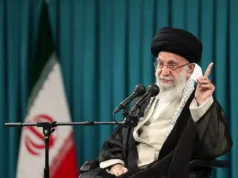Days after Palestinian President Mahmoud Abbas told the United States it has one month to negotiate a freeze on settlement construction with Israel or risk the end of peace talks, Israeli Prime Minister Benjamin Netanyahu announced that he would extend the freeze if the Palestinian Authority (PA) would “unequivocally say to its people that it recognizes Israel as the nation-state of the Jewish people.”
The Palestinians quickly and “forcefully” rejected the proposal, which chief negotiator Saeb Erekat called “racist demands” and “Israeli games.” Nabil Abu Rudaineh, a spokesman for PA President Mahmoud Abbas, said the Palestinians are willing to recognize the state of Israel but not “Israel’s Jewishness.”
Direct talks between Israel and the Palestinians slowed after Israel’s ten month moratorium on settlement construction ended on September 26. In response, during a meeting with the Arab League last week in Libya, President Abbas announced “alternatives” to the direct Israeli-Palestinian peace talks, which include “ask(ing) the United States to recognize the state of Palestine on the 1967 borders” and “going to the (UN) Security Council to get a resolution that calls upon member states to recognize the state of Palestine on the 1967 borders.”
If those were to fail, Abbas said he would call on Israel to take full control of the territories and disband the Palestinian Authority. In light of what should be seen as a direct threat by the Palestinian president, Netanyahu announced his compromise.
 While harshly (but not surprisingly) dismissed by the PA, Netanyahu’s proposal makes perfect sense. Israel’s demand for recognition as a Jewish State is not just Israeli games and racism against Palestinians or non-Jews. Rather, it is the heart of the Israeli-Palestinian conflict.
While harshly (but not surprisingly) dismissed by the PA, Netanyahu’s proposal makes perfect sense. Israel’s demand for recognition as a Jewish State is not just Israeli games and racism against Palestinians or non-Jews. Rather, it is the heart of the Israeli-Palestinian conflict.
As Netanyahu said, “For 100 years, the Palestinians have taught entire generations to believe that there is no Jewish people, that this land is their homeland alone.” Indeed, a large part of the Palestinian narrative is based on rejecting the existence of a Jewish state in any part of the territory they call Palestine. Recognizing Israel as a Jewish State, therefore, would signal that the Palestinian leadership is finally willing to accept Israel’s existence. At the same time, Israel would (again) signal to the Palestinians that it is ready to accept a Palestinian state in areas of the West Bank by freezing settlement construction there.
As an aside, it is important to note that Israel has never rejected the religious status of its neighboring Muslim states, nor would it reject a future Palestinian state characterized as Muslim. In addition, Israel’s non-Jewish citizenry have full rights in the country; Israel is actually one of the only countries in the Middle East where Arab women are allowed to vote.
As U.S. State Department spokesman P.J. Crowley said on Tuesday, “both sides need to take steps if we are to see the necessary conditions for negotiations to continue.” Indeed, Israeli-Palestinian peace talks will end here if either side is not willing to compromise. Abbas should not expect Israel to halt settlement construction, thereby recognizing that land as where a future Palestinian state will be, without the Palestinian leadership doing the same and recognizing Israel for what it is. If the Palestinians are serious about peace, they would take Netanyahu up on his offer and part with their mythology that millions of Palestinian refugees will one day be allowed to return to live in the Jewish State.





